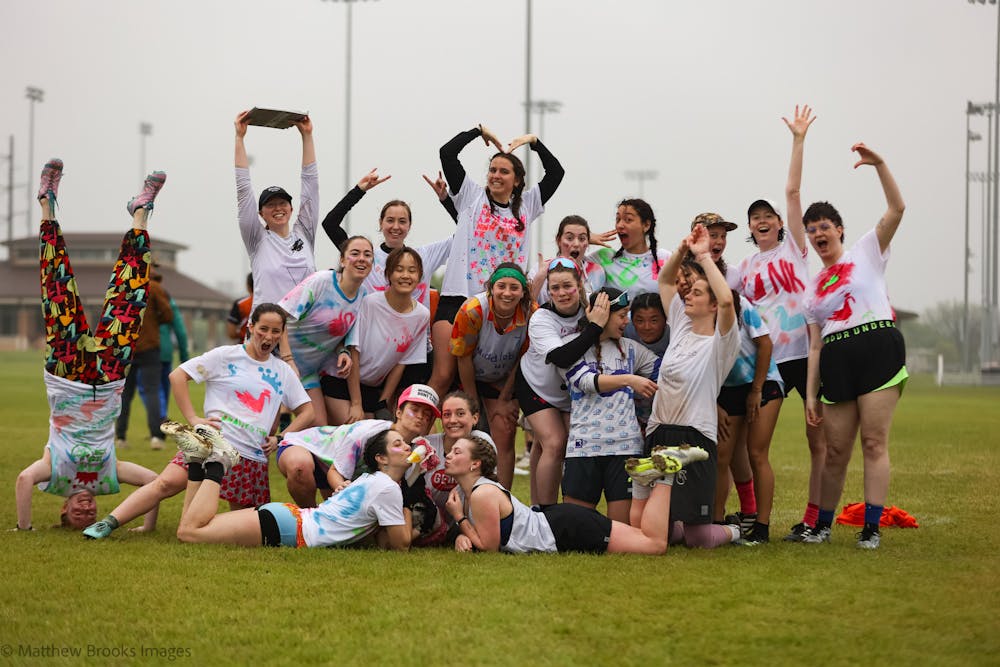The sport of frisbee can be traced back to Middlebury College students in the fall of 1939. The story goes that a group of brothers from Delta Upsilon — Middlebury still had fraternities at this time — were traveling to a fraternity convention in Nebraska, devouring Frisbie Fruit Pies in the car. When finished, they tossed the leftover pie tin to one another while waiting for a flat tire to be repaired.
What began as simple pie tin tosses evolved after World War II. In 1948, Walter Fred Morrison, a West Coast inventor and building inspector, created plastic versions marketed as “flying saucers.” By 1957, Wham-O Manufacturing Company purchased Morrison’s design and, after discovering the popularity of a campus game called “Frisbie” during market research, began selling the discs under the registered trademark “Frisbee.”
In the 1980s, the debate over frisbee’s origins became contentious, with Yale University, among others, claiming authorship of the game. To quell the controversy, Middlebury’s president at the time, Olin Robinson, commissioned Patrick Farrow to create a bronze sculpture of a dog catching a flying disc in its mouth, which still stands proudly on Battell Beach.
Middlebury stopped throwing pie tins in 1977, when the Middlebury Pranksters Ultimate Frisbee Club was founded. Nearly 50 years later, the Women’s Ultimate Frisbee team has made a name for itself on the national stage. They’ve won three out of the past four D3 national championships. Last year, they made it to the semi-finals in a rebuild year.
The team, made up of around 25 players, calls itself the Pranksters. Despite being one of the most successful teams on campus, they like to keep things fun and free-spirited.
“We are on a mission to be competitive that is facilitated by love and fun and great chemistry,” Claire Rhyneer ’26 told The Campus. “It’s a pretty eclectic group of people, extremely fun — like work hard, play hard. I think we’re unafraid to be weird on campus. We are an extremely competitive team, and we are trying to mesh fun and seriousness at the same time.”
Unlike other programs, the Pranksters don’t wear uniforms to most of their tournaments. When they reach the postseason, they’re required to wear them because otherwise it’s not “serious.”
“Well, we’ve just won the past three championships,” Rhyneer declared. “We are completely serious about this.” It's a testament to their confidence that they can reject conventional trappings of competitive sports while still dominating the league.
Another thing the Pranksters do without — a coach. The three captains run all the practices.
“We don’t have a coach,” said co-captain Liz Crawford ’25. “And I think there’s a lot to be said for intrinsic motivation and autonomy in that.”
Most dominant teams in history are defined by a great coach, such as Geno Auriemma, whose UConn basketball team notched its 12th NCAA women’s championship this past Sunday. But that’s not the case with the Pranksters.
The player-led coaching fosters a different kind of motivation.
“We show up and play and want to put in the effort just for the team and for each other,” Crawford said. “I think that that harbors a really competitive and driven environment that a lot of other teams don’t necessarily have because they’re driven by a coach telling them what to do.”
However, there are certain downsides to the Pranksters not having a coach. It’s a full-time job for the captains to plan practices, take care of travel logistics, and scramble to raise funds so they can afford to go to Nationals.
The Pranksters also receive limited funding from the school. Since frisbee is not a varsity sport, they do not have access to a personal trainer, and the players cannot access the athlete gym. They also have to work around varsity teams when scheduling their practices.
“It starts to feel really frustrating when we’re trying to be competitive, train really hard, and there’s no recognition from this school that we should be housed under athletics rather than a student organization,” Rhyneer said.
Miraculously, the Pranksters have made their unorthodox situation work. They practice three to four times weekly as a team and do conditioning on their own once a week. When traveling to tournaments, they drive their own cars or pay for their own flight tickets. Despite these challenges — or perhaps because of them — the Pranksters have forged unbreakable bonds that translate into chemistry on the field.
As expected, the team will be back challenging for a championship this year. They have a strong group with experienced winners, but also talented underclassmen like Ella Widmyer ’28.5, a first year who plays for the U-24 US National Team.
The Pranksters are already off to a roaring start this season after winning the Northeast Classic. This weekend they will play in sectionals, the first step on the path to Nationals, which will be held in Seattle. That flight across the country won’t be cheap – it’s $400 per person, which will mostly come out of the players’ pockets.
The Pranksters carry on a proud Middlebury legacy that dates back to those first pie tin tosses in 1939. Despite their success — three national championships in four years — they continue to self-fund, self-coach and self-organize.
The bronze statue on Battell Beach commemorates where the sport began. Perhaps it's time for the college to honor where these dedicated athletes have taken it. The Pranksters have proven themselves on the national stage; now they deserve to be recognized as the champions they are at home.




